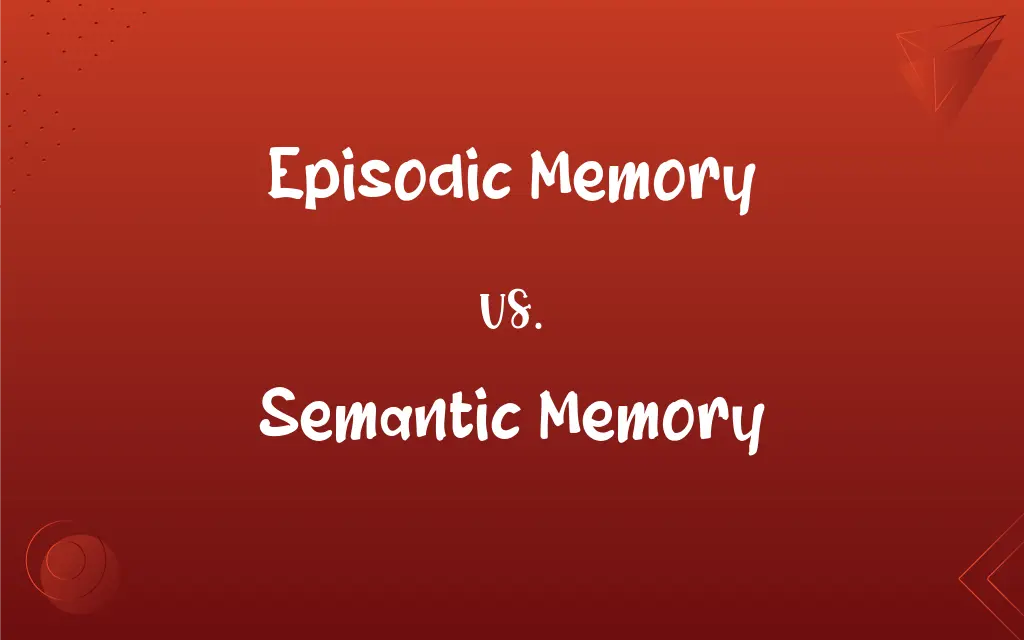Episodic Memory vs. Semantic Memory: What's the Difference?
Edited by Aimie Carlson || By Harlon Moss || Updated on October 10, 2023
Episodic Memory: Recollection of specific events, situations, and experiences. Semantic Memory: General world knowledge that we have accumulated throughout our lives.

Key Differences
Episodic memory involves the recollection of personal experiences and events, often entailing a mental time-travel or remembering aspect. Semantic memory, conversely, relates to facts and knowledge, independent of personal experience or familiarity.
Episodic memory enables individuals to consciously recollect previous experiences and events in a serial form, from which one can reconstruct various instances and occurrences. Semantic memory, though, maintains no tie to personal events and is utilized in understanding symbols, language, and problem-solving.
Episodic memory can be deeply personal, often tied to emotions, and context, allowing individuals to recall where and when an event took place. In contrast, semantic memory encapsulates our knowledge about the world and the meaning of objects and symbols without linking to any specific event or occurrence.
Episodic memory is highly dependent on conscious recall and often engages various sensory and spatial-temporal aspects. Semantic memory permits the understanding of words and concepts and doesn’t typically require conscious recall of where or when the knowledge was acquired.
Episodic memory and semantic memory, while distinct, can interact and influence one another, wherein personal experiences (episodic) can shape and modify general knowledge (semantic), and vice versa, despite their core functional and experiential differences.
ADVERTISEMENT
Comparison Chart
Type of Information
Specific events and experiences
General knowledge and facts
Dependency on Time/Place
Strongly tied to a specific time and place
Not linked to any particular time or place
Conscious Recall
Requires conscious effort and recall
Accessed without conscious recall
Emotional Connection
Often emotionally charged and personally significant
Lacks personal emotional context
Usage Example
Remembering one’s wedding day
Knowing the capital city of a country
ADVERTISEMENT
Episodic Memory and Semantic Memory Definitions
Episodic Memory
Episodic memory helps recall specific events experienced directly, involving autobiographical details.
She cherishes her episodic memory of the first meeting with her lifelong friend.
Semantic Memory
Semantic memory encompasses our knowledge of facts, concepts, and ideas.
Her semantic memory provided the information that Paris is the capital of France.
Episodic Memory
Episodic memory often entails a mental journey to past events, involving contextual and spatial-temporal details.
His episodic memory vividly replayed the joyous moment of his graduation day.
Semantic Memory
Semantic memory helps in recognizing objects and understanding various concepts and general facts.
His semantic memory assists him in recognizing apples as a type of fruit.
Episodic Memory
Episodic memory is subject to forgetting, especially if the events lack emotional charge or repetitiveness.
The man struggled with the decay of episodic memory concerning his childhood pranks.
Semantic Memory
Semantic memory is crucial for understanding the world around us, devoid of personal involvement or context.
Her semantic memory effortlessly identified that triangles have three sides.
Episodic Memory
Episodic memory can be impacted by psychological factors and may be selectively remembered or suppressed.
He found that his episodic memory of the traumatic accident was sometimes inaccessible due to coping mechanisms.
Semantic Memory
Semantic memory facilitates our understanding of language and symbols without referencing personal experiences.
His semantic memory enables him to understand the meanings of words in a sentence.
Episodic Memory
Episodic memory involves a conscious effort to retrieve stored memories related to particular instances.
Her episodic memory provided detailed insight into the vibrant colors of the sunset she witnessed years ago.
Semantic Memory
Semantic memory is not linked to the personal recollection of learning the information.
Though she didn’t recall learning it, her semantic memory knew that whales are mammals.
FAQs
Can semantic memory affect our language understanding?
Yes, semantic memory crucially influences understanding language, concepts, and general world facts.
Does semantic memory influence academic learning?
Yes, it provides foundational knowledge essential for learning and understanding new information in an academic context.
How does aging affect episodic memory?
Aging can impact episodic memory, sometimes leading to its decline or alterations in recalling specific events.
Is semantic memory essential for social interaction?
Yes, semantic memory helps us understand language and social norms, which are crucial for social interactions.
Can episodic memory be improved?
Yes, through various cognitive exercises and strategies, episodic memory can potentially be enhanced.
What is episodic memory?
Episodic memory is the recall of personal experiences and events, including specific times and places.
What characterizes semantic memory?
Semantic memory involves storing and recalling factual knowledge, devoid of personal context or experience.
Is semantic memory reliant on conscious recall?
No, semantic memory allows for the effortless retrieval of facts without consciously thinking about learning them.
Can episodic memory alter over time?
Yes, episodic memory can change or fade due to various factors like time, psychological factors, or lack of recall.
Does semantic memory involve knowing how to do things?
No, knowing how to do things involves procedural memory; semantic memory deals with factual knowledge.
How is semantic memory stored in the brain?
Semantic memory is stored in various brain regions, notably in the temporal lobes and is interconnected with other brain areas.
Can episodic memories be inaccurate?
Yes, episodic memories can be subject to distortions or alterations, affecting the accuracy of recall.
How does trauma affect episodic memory?
Trauma can impact episodic memory, possibly leading to memory blockages or selective memory as a coping mechanism.
What is a practical example of using semantic memory?
Recognizing a dog as an animal and understanding what dogs are without recalling specific encounters is using semantic memory.
How reliable is episodic memory in legal contexts?
Episodic memory can be unreliable in legal contexts due to possible distortions and the influence of external factors.
Can we always trust our semantic memory?
While generally reliable for factual recall, semantic memory can also contain inaccuracies or be influenced by biased learning.
How does episodic memory relate to experiences?
Episodic memory directly relates to individual experiences, allowing recall of events, times, and emotions.
Why is episodic memory often emotionally charged?
Because it often involves personal experiences, which are commonly linked to emotions and feelings.
How do diseases like Alzheimer’s affect semantic memory?
Alzheimer's can impact semantic memory, leading to difficulties in recalling common facts or concepts.
Is it possible to recall an episodic memory without emotional context?
Yes, while episodic memories often have emotional elements, they can be recalled without emotional engagement.
About Author
Written by
Harlon MossHarlon is a seasoned quality moderator and accomplished content writer for Difference Wiki. An alumnus of the prestigious University of California, he earned his degree in Computer Science. Leveraging his academic background, Harlon brings a meticulous and informed perspective to his work, ensuring content accuracy and excellence.
Edited by
Aimie CarlsonAimie Carlson, holding a master's degree in English literature, is a fervent English language enthusiast. She lends her writing talents to Difference Wiki, a prominent website that specializes in comparisons, offering readers insightful analyses that both captivate and inform.































































